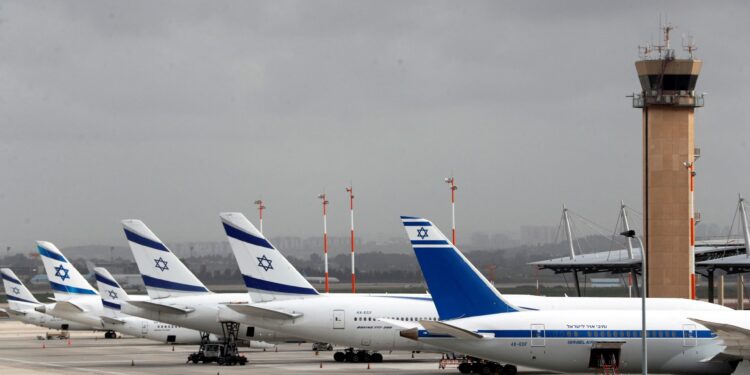9/30/2024–|Last updated: 9/30/202408:07 PM (Mecca time)
The Israeli economic newspaper Calcalist said that Israel will be more deserted than ever during the holiday season, after the European Aviation Authority recommended avoiding travel to Israel until the end of next October, which prompted many foreign airlines to suspend their operations.
The newspaper pointed out that the crisis is worsening in light of the inability of local airlines to cover the increasing demand, with limited crews, and the inability to recruit foreign crews.
This situation has increased pressure on local airlines, which are already suffering from full flights, staff shortages, and difficulty recruiting foreign crews.
The newspaper says that the aviation sector – which is already suffering as a result of the ongoing war and increasing security concerns – has received another blow with the European Aviation Authority’s warning, and as a result, the three main Israeli airlines, “El Al”, “Israir” and “Arkia”, are facing huge demand. On its services.
According to figures from Calcalist, only about 20 foreign airlines are still operating flights to and from Israel, a sharp decline compared to the 150 airlines that were active before October 7.
Rapid collapse in the aviation sector
The situation worsened further after Israel assassinated Hezbollah Secretary General Hassan Nasrallah, prompting the European Aviation Authority to issue its recommendation to avoid Israeli airspace, which further complicated the crisis and increased pressure on Israeli airlines to meet the increasing demand from passengers who were left stranded due to the cancellation of the crisis. Foreign airlines for their flights.
El Al reported an exceptional influx of passengers searching for last-minute flight options, pushing the company to its operational limits. Company representatives admitted that they were unable to meet all requests for assistance, especially for passengers who were stuck in major airports around the world.
Company representatives said, “All of our scheduled seats are fully booked, and we currently do not have the capacity to operate rescue flights for those stranded abroad, as we did at the beginning of the war,” according to what Calcalist reported.
Limited solutions and financial pressures
Aviation industry experts expressed doubts about El Al’s ability to maintain the increase in flights to a number of destinations, as efforts to lease additional aircraft appear unrealistic due to a global shortage of aircraft, and the refusal of foreign crew members to work in Israel due to security concerns.
The US Aviation Authority took similar measures during Operation Protective Edge in the Gaza Strip during the summer of 2014, but even at that time, more than 30 foreign airlines continued to operate their flights to Ben Gurion Airport, but this time the European authorities’ recommendation classified Israel as part of the From a dangerous war zone, which further complicated matters.
Israir and Arkia are also suffering from the sudden increase in demand, according to Calcalist.
Absence of a governmental role
Amid this chaos, the head of the cargo ports at Ben Gurion Airport, Nehama Ronen, criticized the lack of a government response, saying, “The government of Israel is frozen and not responding to the situation.”
Ronen expressed frustration at the lack of communication and guidance from the Ministry of Transport, stressing the need to take proactive measures to reassure foreign airlines about the safety measures Israel is taking.
In response, Transport Minister Miri Regev issued a public statement stating that her ministry was in contact with Israeli airlines “to ensure their readiness in accordance with the Minister’s directives and to assist in the repatriation of Israelis from Larnaca and Athens to Israel.” However, criticism suggested that the statement did not address the wider impact of the European Aviation Authority’s recommendation.
Implications for shipping and tourism
The continuing crisis in the Israeli aviation sector has had a significant impact on air cargo operations. In August alone, there was a decline of more than 9% in the volume of air cargo arriving in Israel, with a significant decline of 57% in cargo transported via passenger flights. .
The disruption in international flights was the reason for this decline, which led to a 31% decline in outgoing cargo via passenger aircraft.
Yossi Fischer, an aviation and tourism expert who follows the situation, warned that Israel’s aviation sector may return to normal operations only in the spring of 2025, in the best-case scenario.
He noted that airlines plan their routes months in advance, making it unlikely that foreign companies will resume flights to Israel anytime soon.



